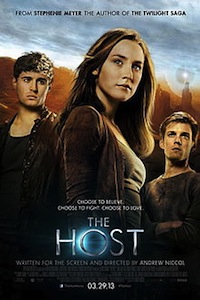 So often with films, and more specifically high-budget movies coming from major studios with millions of dollars on the line, there is a single choice or a couple of decisions that push a film from being thoroughly successful to not quite. This can be a scene that feels out of place, a piece of dialogue that gets forced or breaks a character, or maybe it’s a miscast actor. There are so many decisions that go into making a film; it is more likely than not one of those choices will backfire.
So often with films, and more specifically high-budget movies coming from major studios with millions of dollars on the line, there is a single choice or a couple of decisions that push a film from being thoroughly successful to not quite. This can be a scene that feels out of place, a piece of dialogue that gets forced or breaks a character, or maybe it’s a miscast actor. There are so many decisions that go into making a film; it is more likely than not one of those choices will backfire.
When it comes to deciding how to move an onscreen narrative forward, voice over dialogue is the copperhead of techniques. It is truly dangerous. When handled correctly voice over can complicate a story or ease a scene. It can give the audience a piece of information that they otherwise would not have access to.
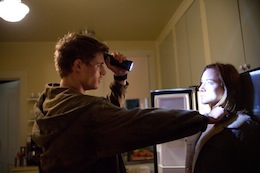 For every Sunset Boulevard, Fight Club, or Annie Hall, there are dozens of films that mishandle the voice over. These failures either attempt to alleviate onscreen confusion through ad hoc voice over, or worse tell us what we can already see, thus crushing an otherwise compelling story with duplicate and triplicate sets of information.
For every Sunset Boulevard, Fight Club, or Annie Hall, there are dozens of films that mishandle the voice over. These failures either attempt to alleviate onscreen confusion through ad hoc voice over, or worse tell us what we can already see, thus crushing an otherwise compelling story with duplicate and triplicate sets of information.
The Host, an adaptation of yet another Stephenie Meyer novel, falls into the latter camp.
Andrew Niccol, who wrote The Truman Show and wrote and directed Lord of War and Gattaca, is more than capable of creating a compelling visual story, but in a single stroke his dependable cast, engaging visuals and otherwise solid story are undone by ham-handed use of voice over.
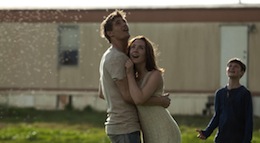 In The Host, aliens which refer to themselves at “souls,” have descended upon Earth. These alien parasites infiltrate a human host and take over their body. The invasion has spread like a virus and soon all but a small band of humans remain.
In The Host, aliens which refer to themselves at “souls,” have descended upon Earth. These alien parasites infiltrate a human host and take over their body. The invasion has spread like a virus and soon all but a small band of humans remain.
Amongst these humans are Melanie (Saoirse Ronan) and her brother, Jamie (Chandler Canterbury), who fall in with Jared (Max Irons), another human on the run. Things go well until the trio is discovered, and Melanie sacrifices herself for Jared and Jamie’s safety.
Melanie now exists only as an internal consciousness trapped inside the body that an alien, Wanderer aka Wanda, now controls.
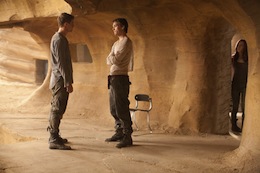 The Host could have been an exploration of internal conflict, or a mystery that questions whether Melanie still exists in this body that once belonged to her. There could be discussions of subjecthood versus objectification, questions of ownership in regards to one’s body. These ponderable thoughts rely on the tension that could build if and only if we could not say for certain whether Melanie is still inside of her body, or whether only Wanda remains.
The Host could have been an exploration of internal conflict, or a mystery that questions whether Melanie still exists in this body that once belonged to her. There could be discussions of subjecthood versus objectification, questions of ownership in regards to one’s body. These ponderable thoughts rely on the tension that could build if and only if we could not say for certain whether Melanie is still inside of her body, or whether only Wanda remains.
Because of Melanie’s voice over, the audience knows not to question her existence. In fact these inner comments did such a thorough job of removing tension or the satisfying conundrums that come from a good mystery or emotional drama that I knew without even a fraction of a doubt that everything would be fine and all would be resolved in the most trite and prepackaged way possible. I envied the onscreen humans whose ignorance allowed them to wonder and debate as to Melanie and Wanda’s makeup.
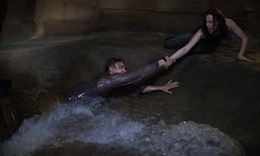 It was boring and disappointing, because it did not have to be that way. The visuals are expertly constructed, the onscreen characters are interesting and the actors develop them with grace and skill, even the story, which at times wallows in the mire of teen inanity, is pretty good.
It was boring and disappointing, because it did not have to be that way. The visuals are expertly constructed, the onscreen characters are interesting and the actors develop them with grace and skill, even the story, which at times wallows in the mire of teen inanity, is pretty good.
The line between a good or even great film, and an abject failure is so thin, so tenuous. Niccol was most likely trying to stay true to the nature of the novel, but by employing voice over to explore the all-mental character of Melanie his film version of The Host crosses the line from smart to stupid.
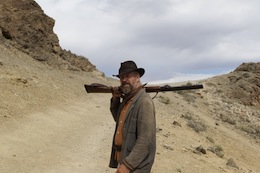 I hope that they release a Blade Runner-ish director’s cut that removes most if not all of the voice over, and allows the viewer the mental breathing room to wonder at the nature of the characters they are watching.
I hope that they release a Blade Runner-ish director’s cut that removes most if not all of the voice over, and allows the viewer the mental breathing room to wonder at the nature of the characters they are watching.
That film, not this one, would definitely be worth viewing.







{ 4 comments }
The book was all about the internal dialouge between Melanie and Wander so I’m guessing this the reason they took that route w/the movie. I wondered how they would portray it on the screen.
I figured that was the case, Jessica. I can see how it would work well as a literary technique, but it is so goofy in the film.
The internal dialogue annoyed me at first but I got use to it.
Dave,
You should have stayed annoyed. The internal dialogue never got better, you just became desensitized. Perhaps you were taken over by an alien Soul. Don’t worry. We know you’re still in there Dave. We’ll find a way to get you back.
Stay strong, and fight bad voice over!
Comments on this entry are closed.